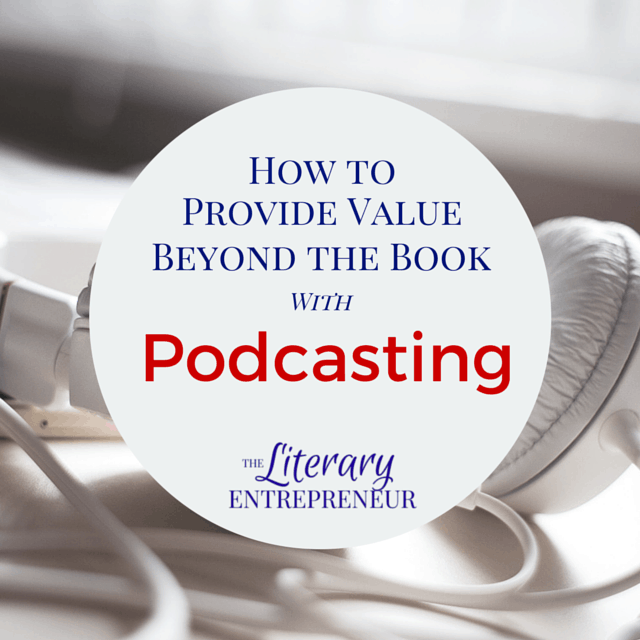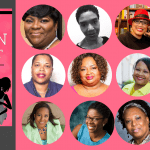How to Provide Value Beyond the Book with Podcasting
Podcasting can be a great way to build an audience. It seems to have become really popular again all of a sudden. I say again because podcasting came on the scene when Apple made podcasting big. I believe the term podcasting originated when iPods were introduced to the world. In recent years, podcasting seemed to slow down a bit. Now everyone is trying out podcasting. Why not? Audio is easy to listen to on the go whether during travel, at work, or in a gym. It’s not too hard to create an audio recording. In fact let’s look at seven ways to record audio below.
7 Ways to Record Audio
If you want to keep it simple, you can use online services to record audio excerpts from your book (s) or audio interviews. Most of these websites provide embed codes so you can include audio files on your website.
Now let me start off by saying there are much better and more expensive ways that involve more equipment like a really good microphone, soundproof area, etc. If you’re just starting and want to see how it works, these are for you.
With the platforms that use a call-in phone number, a landline phone probably is best. I finally chucked my landline phone earlier this year. Can’t say I miss the bill. So, usually when I record interviews, I mainly use my headset with my iPhone 6 in a quiet area of my house.
1| Audio Acrobat
This platform is pay, but you can embed the recorded files where you want them. I used them for many years until I decided to switch over to another way to record podcasts. You receive your own call-in number and it’s a great place to host files.
2| Blog Talk Radio
This platform is free up to 5 simultaneous guests/listeners on your show. You receive your own call-in phone number. This is probably the most popular platform as well as the most expensive especially if you’re hosting a primetime radio show. If you’re thinking in terms of a weekly radio show, this maybe for you.
Podcasting to me seems a bit more free from using a scheduled time slot and is more for on-demand listening. Content on Blogtalkradio is recorded for on-demand listening and can be found on Itunes.
SIDE NOTE: As an author you definitely want to consider being a guest on an online radio show as a part of your book promotion. You can embed the interview on your media page.
3 | Freeconferencecall.com
It’s free! You receive your own call-in phone number. I personally use this platform now to record my interviews. Sometimes you may have an unexpected dropped call which can be a bit embarrassing in the middle of an interview, but I record and edit later.
4 | RINGR
As an iPhone user, the RINGR app was new to me. It’s also available for android phone users too.
I used it for the first time when Chris Well over at DIYauthor interviewed me. You can listen to the interview to get an idea of the sound quality and also check out Chris’ interview with the Tim Sinclair, the founder of RINGR.
Follow them online at @ringr_us
[clickToTweet tweet=”Podcasting can be a great way to build an audience. ” quote=”Podcasting can be a great way to build an audience. ” theme=”style2″]5 | Spreaker
Spreaker makes it really easy to sign-up using your Facebook account. They also integrate well with Youtube, meaning you can record a podcast and distribute to a Youtube channel. I love this because I have been able to build up my channel with content.
Spreaker show hosts can submit their show for possible inclusion on iHeartRadio. They also give show hosts the ability to branch out into the world of customized apps.
By now, you probably have figured I really like Spreaker. I’m in no way selling it to you, but I use Spreaker for The Literary Entrepreneur Podcast. I also use the Pro version (100 hours) because I like using them as the host for my MP3 files and like the player. With Pro, they do offer the ability to broadcast live. In all honesty, I have not seen a way to do interviews so I upload my MP3 files to Spreaker after I edit. View the recent podcast below.
6 | SoundCloud
This platform is free for up to four hours. You can pay for more hours and they allow you to add your feed to iTunes. You can record or upload your MP3 file.
I was really drawn to this platform first before I discovered Spreaker. They have the most beautiful audio players. I tried the paid format for awhile, but after I did a comparison, I felt like Spreaker offered more hours for what I needed. I still use SoundCloud personally for my books. To me it’s an awesome platform for posting audio excerpts.
[clickToTweet tweet=”Check out 7 Ways to Record Audio for a Podcast” quote=”Check out 7 Ways to Record Audio for a Podcast” theme=”style2″]7 | Your Smartphone
I mentioned earlier I use my Apple headset with my iPhone 6. Using the Voice Memos app, I have been pretty impressed with the audio quality. In fact recently in the anthology, When Women Become Business Owners, I asked several of the contributors to record short excerpts. Some sent me files recorded with their phones.
Listen below (and also see how easy it is to add thear players to your website):
Jamillah Warner (iPhone)
Dr. Moe Anderson (Android)
A commercial that I recorded (iPhone, added music later during editing)
More Podcasting Resources …
Your next question maybe, how do I edit and how did I add the music to the commercial above. Well, I use Camstasia, but others talk a lot about Audacity, which is free and open source.
There are plenty of other podcasting resources out there for you to get started. Here are a few:
- If you want to be a full-fledged podcaster and build a following on iTunes, I would suggest you check out Pat Flynn’s step by step tutorial at How To Start a Podcast. It’s one of the best tutorials I’ve seen.
- John Lee Dumas from Entrepreneur on Fire Podcast offers a Free Podcast Course.
- Book marketing guru, D’Vorah Lansky started podcasting for authors challenge.
There you go folks, How to Provide Value Beyond the Book with Podcasting. You have the tools!
Tell me about your podcasts for “literary entrepreneurs” or let me know if you want to be a guest on The Literary Entrepreneur Podcast.
Tyora Moody is the author of Soul-Searching Mysteries, which includes cozy mystery, women sleuth mystery, and mystery romance under the Christian Fiction genre. Her books include the Eugeena Patterson Mysteries, Serena Manchester Mysteries, Reed Family Mysteries, and the Victory Gospel Family Series.
When Tyora isn’t working for a literary client, she’s either loving on her cats, listening to an audiobook or podcast, binge-watching crime shows or Marvel movies, and of course, thinking about the next book. To contact Tyora about reviewing her books or book club discussions, visit her at TyoraMoody.com.




